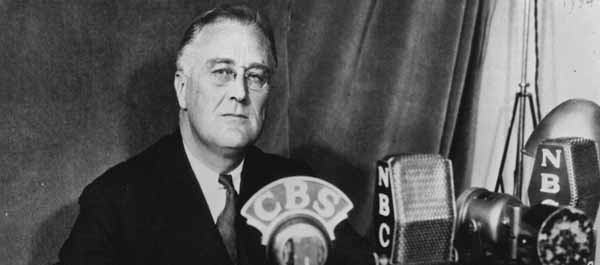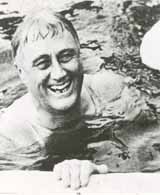A Young Boy’s Unforgettable Experience in World War II

By 1921 Franklin Delano Roosevelt had already served as a New York State senator for two years, as the Assistant Secretary of the Navy for over seven years, and as the Democratic candidate for vice-president in the election of 1920 that was won by Republican Warren G. Harding. Out of politics in 1921, Roosevelt was practicing law in New York City.
In August 1921 he was struck down with polio while at the family’s summer retreat on Campobello Island, New Brunswick. It was a place that FDR had been coming to since the age of four where he could engage in a variety of sports in a carefree environment. Although he refused to ever admit it, polio left his legs permanently paralyzed.
{default}Although FDR’s polio would become the dominant event of his life, he was determined never to become an invalid or to let his handicap deter him from pursuing and winning public office. In January 1929 he became the 44th governor of New York and in 1932 was elected the 32d President of the United States.
FDR fought the good fight against polio and tried every available therapy in an effort to improve his condition. He did exercises with his legs both in a pool and through the use of hydrotherapy. Out of public view he used a wheelchair or was sometimes carried but in public he was careful throughout his life never to allow himself to be portrayed as a man with a major disability. With braces on his legs and with the use of a cane or crutches he was able to laboriously and awkwardly walk short distances.
 In 1924 FDR sought comfort and possible improvement in his condition from the healing waters of the mineral springs at Warm Springs, Georgia. For the next two decades it would become a retreat and a haven for FDR and the cottage he built there several years later would in the 1930s be dubbed the Little White House.
In 1924 FDR sought comfort and possible improvement in his condition from the healing waters of the mineral springs at Warm Springs, Georgia. For the next two decades it would become a retreat and a haven for FDR and the cottage he built there several years later would in the 1930s be dubbed the Little White House.
Roosevelt also founded a therapy center for polio patients at Warm Springs that is now known as the Roosevelt Institute for Rehabilitation.
By 1945 Roosevelt’s health was in severe decline. Photographs of him depict a man who looked exhausted. He lacked energy and spoke openly of retiring in perhaps a year even though his fourth term as president was scheduled to last through 1948.
At the end of March 1945 the Allies were already deep into Germany and it was just a matter of time before the war ended. Roosevelt retreated to Warm Springs and as one of his biographers, Conrad Black, notes: “The magic of Warm Springs seemed to work on Roosevelt in April 1945 as it often had before. After a few days he was no longer gray and torpid; his color and his appetite returned and he gained some weight and animation, although his blood pressure continued to fluctuate.” (Franklin Delano Roosevelt: Champion of Freedom, Public Affairs, 2003, p. 1107.)
On the early afternoon of April 12, Roosevelt was posing for a painting when he announced that he had a terrific pain in the back of his head. He was immediately carried to his bed where he suffered a cerebral hemorrhage and became comatose. At 3:35 p.m. his breathing ceased. Word of his death soon spread like wildfire across the United States.
In April 1945 I was eight and one-half years old. Thursday, April 12 was a typically warm, and pleasant, sunny day in Berkeley, California, where I grew up, nearly three thousand miles distant from Warm Springs. Coincidentally, it was also the day I asked my mother if I could go to Oakland by myself to see the latest newsreels at a matinee. I usually went with my father but since he was at work that day I decided that it would be an adventure to go off on my own for one of the first times.
She said OK but gave me strict instructions on how to get to my destination and the usual do’s and don’ts that a young boy traveling by himself should know about. I was to come home at once at the end of the film. And so, off I went that afternoon to ride a streetcar from nearby College Avenue to downtown Broadway where the cinema was located. I don’t remember anything at all about what was being shown. But I do vividly and will forever recall what occurred there that afternoon.
There were not many people present in the theater, probably no more than about thirty or so. About halfway through the program the film suddenly stopped and a man appeared on the dark stage. He said he was sorry to have to tell everyone that President Franklin Delano Roosevelt had just died in Warm Springs, Georgia.
This announcement was followed by momentary silence as people began to grasp the enormity of what they had just been told. For a few moments there was utter silence but soon virtually everyone began to cry. It seemed as if the entire theater was suddenly engulfed by the spontaneous sound of people crying and sobbing. It was the most moving and unforgettable scene I have ever been a part of. Although the film eventually continued, hardly anyone remained to see it. I remember leaving the theater after the announcement and returning home, perplexed and saddened by what I had just witnessed.
When I got there my mother had already heard the news and she too had clearly been crying. I was too young to recollect anything about the politics of that era and how much disparity there was between followers of the two parties. What instead was evident that day and in the days that followed was that politics played little role in the national grief that emanated from the death of FDR.
In the age before television I knew little about FDR except that his voice was a familiar one often heard on our radio during one of his fireside chats or speeches to the nation that my grandfather and parents would always listen to. Little could I know that my future army career would take me to many of the places I had seen in the newsreels shown regularly during the war or that I would one day be fortunate enough to write about famous men like Patton, Eisenhower and Churchill or that FDR would be an important part of my work as an historian.
However, what I will forever carry vividly in my mind is that FDR died on a spring afternoon in April 1945, a day ordinary Americans shed tears for a dead president.


Thanks for this story. FDR is unforgettable – I love reading about him, his personal life, etc. You write so well, Carlo, and you have a subtle gift for making one want to read more. To me, writers are born, not made.
A Young Boy’s Unforgettable Experience in World War II | Armchair General Magazine – We Put YOU in Command!
A Young Boy’s Unforgettable Experience in World War II | Armchair General Magazine – We Put YOU in Command!